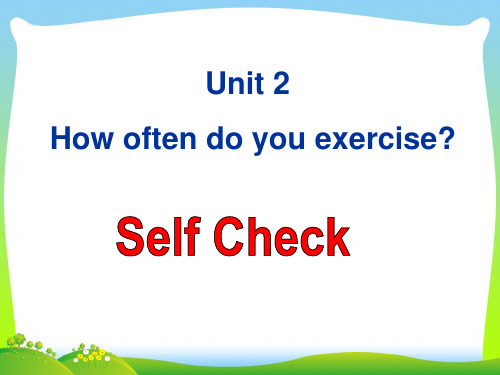人教版八年级上册英语unit2课件
人教版八年级英语上册第二单元课件

The results for “watch TV” are interesting.
_S_o_m__e students watch TV once or twice a week,
s_tio_m_me_es_
students watch TV __t_h_r_e_e__ _o_r_ _f_o_u_r__ a week, but most students watch _e_v_e_ry_
Do you know?
• sometime 某个时间 • some time 一段时间 • sometimes 有时 • some times 几次
I sometimes go to school by bus. I will go to America sometime this year.
人教版初中英语 八年级上册教学课件
Unit 2 How often do you exercise?
Section A Period 1
Are you healthy?
Do you often drink milk? Do you eat fruit and vegetables everyday? Do you often do your exercise?
人教版八年级上学期英语课件:unit 2 Section B(1a-2b)(共41张PPT)

5.How often do you eat junk food?
2 or 3 times a week
6.How often do you drink coffee? never
Bill hardly ever
Junk food is bad for our health.
1a Match the words with the pictures.
a
b
c
d
e
f
Check the answers!
1. __b__ junk food 2. ___a__ milk 3. __e___ fruit 4. __c___ vegetables 5. __f___ sleep 6. __d___ coffee
教学课件
英语 八年级上册 人教版
Unit 2 How often do you exercise?
Section B The Third Period 1a-2b
课前自主预习
1. 垃圾食品 __j_u_n_k__fo_o_d___ 2.对……有好处 ___b_e_g_o_o_d__fo_r_ 3.喝咖啡 _d_r_i_n_k_c_o_f_f_e_e_ 短语互译 4.去野营 __g_o_c_a_m__p_i_n_g_ 5.在某人的空闲时间
2.although conj.虽然;尽管;即使。引导让步状语从句。
Although/Though it was so cold,he went out without an overcoat.尽管天气很冷,但他还是没有穿大衣就出去了。 【注意】 although=though用作连词,意为“虽然,尽 管”,这两个词都不能与but连用,即用了although/though 就不能再用but。不过although可以与yet/still一起使用。 尽管他身体不好,但是他工作很努力。 正:Although/Though he is in poor health,he works hard. 正:He is in poor health,but he works hard. 误:Although he is in poor health, but he works hard.
人教版八年级英语上册 Unit2 Self Check 优质课件

Exercises
I. 单项选择
1. We ___D___ go out to eat but not
very often.
A. usually
B. always
C. never
• 17、儿童是中心,教育的措施便围绕他们而组织起来。2021/7/282021/7/282021/7/282021/7/28
• 2、Our destiny offers not only the cup of despair, but the chalice of opportunity. (Richard Nixon, American President )命运给予我们的不是失望之酒,而是机会之杯。二〇二一年六月十七日2021年6月17日星期四 • 3、Patience is bitter, but its fruit is sweet. (Jean Jacques Rousseau , French thinker)忍耐是痛苦的,但它的果实是甜蜜的。10:516.17.202110:516.17.202110:5110:51:196.17.202110:516.17.2021 • 4、All that you do, do with your might; things done by halves are never done right. ----R.H. Stoddard, American poet做一切事都应尽力而为,半途而废永远不行6.17.20216.17.202110:5110:5110:51:1910:51:19 • 5、You have to believe in yourself. That's the secret of success. ----Charles Chaplin人必须相信自己,这是成功的秘诀。-Thursday, June 17, 2021June 21Thursday, June 17, 20216/17/2021
人教版八年级英语上册Unit 2 Section B (2a-2e)精品课件

• 2%—one to three times a week • 13%—four to six times a week • 85%—every day • Game shows are the most popular.
The best way to relax is through exercise. It's healthy for the mind and the body.
3. Most students use it for fun and not for homework.
What activities do you do in your free time after school?
go camping in the country play computer games
Presentation
2b Read the article and complete the pie charts on the next page.
n Their Free Time?
Last month we asked our students about their free
➢ Task 3 scanning and judging
Read the article and mark True (T) or False (F).
F 1. We found that twenty percent of our students exercise every day.
T 2. Ninety percent of the students use the Internet every day. F 3. Most students use the Internet for homework. F 4. Only twenty percent of the students watch TV two or
人教版英语八年级上册Unit2 Section A 1a-1c课件

D. How D. often
Homework
Keep a weekend diary showing what you do on weekend. You can write down what you do from the time you get up until you go to bed.
➢ Key sentences: — What do you usually do on weekends? — I often go to the movies.
The adverbs of frequency
What do you usually do on weekends?
What do you do on weekends?
Adverbs of frequency(频率副词)
1
always 总是
2 usually
通常
3
often 经常
4 sometimes
有时
5
hardly ever 几乎不
6 never
从不
Do you remember these words?
hardly ever
usually
always
请根据发生频率的不同
1c Talk about the people in the picture abonds?
A: What does he do on weekends? B: He usually watches TV. A: Does he go shopping? B: No, he never goes shopping.
1b Listen and write the letters from the picture above on the lines below.
人教版八年级英语上册Unit2全单元课件

conversations about what you do on
weekends. What do you do on weekends?
I usually watch TV.
Do you go shopping?
No, I never go shopping.
What does she do on weekends?
1. To learn to talk about how often you do things with some adverbs of frequency: always/ usually/ often/ sometimes/ hardly ever /never/ twice…
2. To listen for some specific information in conversations
adv. 几乎不 adv. 在任何时候;从来;曾经
5. hardly ever _w_a_t_c_h__T_V____ hardly ever 6. never (0%) _g_o_s_h_o_p_p__in_g__ 几乎从不
听力原文
Reporter: What do you do on weekends? Girl 1: I sometimes go shopping. Boy 1: I never go shopping.I usually watch TV. Boy 2: I always exercise. Girl 2: I often help with housework. Reporter: How about you? Girl 3: I hardly ever watch TV.I always read. Reporter: Oh,why is that? Girl 3: Oh,I don’t know.I guess I just like
人教版八年级英语上册Unit2 Section A 1a-1c课件

1a Look at the picture. Make a list of the different weekend activities.
1. help with housework 2. _r_ea_d__b_o_o_k_s___ 3. e_x_e_r_c_i_se______ 4. w__a_t_ch__T_V_____ 5. _g_o_s_h_o_p_p_i_n_g__
New words and phrases
housework n. 家务劳动;家务事
hardly adv. 几乎不;几乎没有
ever adv. 在任何时候;
从来;曾经
hardly ever
几乎从不
once adv. 一次;曾经
twice adv. 两次;两倍
New words and phrases
Listen again and fill in the blanks.
Reporter: What do youu_s_u_a_l_ly__do on weekends? Girl 1: I s_o_m__e_ti_m_e_s_ go shopping. Boy 1: I _n_e_v_e_r__ go shopping. I usually watchTV. Boy 2: I _a_l_w_a_y_s_ exercise. Girl 2 : I __o_f_te_n__ help with housework. Reporter: How about you? Girl 3: I _h_a_r_d_l_y_e_v_e_r____ watch TV. I _a_l_w_a_y_s_
人教版八年级英语上册Unit2课件

Unit 7 Will people have robtos?教材解读本单元主要内容是通过引导学生展望未来,引出will 一般将来时的运用:随着各项活动的展开,使得学生形成更加科学合理的价值观,教材紧紧围绕展望未来这一主题展开了各项活动,旨在培养学生的听说读写技能。
单元目标一、知识与技能1. 能掌握本单元重点词汇:paper, pollution, prediction, future, pollute, environment, planet, earth, plant, part, play a part.2. 进一步学习运用所学的知识来陈述自己对将来的看法;学会谈论自己对将来的预言。
3. 掌握情态动词will来表达一般将来时态这一语法知识,4. 提高听力、阅读、写作能力。
二、过程与方法Explanation, discussion, listening, pair work.三、情感、态度与价值观通过引导学生展望未来,及对未来生活的设计,来达到前景教育的目的,同时也通过对前景的设想,让学生在潜移默化中反省自己的现状,培养更加优秀的生活习惯和学习习惯,并形成更科学的价值观。
在学习过程中培养小组合作精神,锻炼他们的胆量,激发学习兴趣。
教法导航以学生为中心,以活动为驱动点,以任务为目标的教学方式,充分利用多媒体,让学生在活动中感知、领悟、体验和实践语言知识要点。
学法导航在实践与合作中提高语言的综合使用能力,加深对基础知识的掌握和记忆。
课时支配第1课时:Section A1a-2c第2课时:Section A 2d-3b第3课时:Section B 1a-2e第4课时:Section B 3a-Self Check第1课时Section A 1a-2c教学目标一、知识与技能1. 能掌握以下单词:paper, pollution, prediction, future, pollute, environment, planet, earth, plant, part, play a part.2. 能掌握以下句型:What will the future be like?Cities will be more polluted. And there will be fewer trees.Will people use money in 100 years?Will there be world peace?Kids will study at home on computers.They won’t go to school.二、过程与方法采用目标和直观教学法,调动学生的积极性,引导他们积极参与课堂。
- 1、下载文档前请自行甄别文档内容的完整性,平台不提供额外的编辑、内容补充、找答案等附加服务。
- 2、"仅部分预览"的文档,不可在线预览部分如存在完整性等问题,可反馈申请退款(可完整预览的文档不适用该条件!)。
- 3、如文档侵犯您的权益,请联系客服反馈,我们会尽快为您处理(人工客服工作时间:9:00-18:30)。
八年级上册英语unit2课件
人教版八年级上册英语unit2课件
学习目标【Learning objectives】
1.熟练掌握下列单词:housework, hardly, ever, hardly ever
2.掌握频率词汇及询问活动频率;熟练运用一般现在时态.
3.能听懂并熟读文中的对话:
A:What do you usually do on weekends?
B:I often go to the movies.
A: Do you go shopping?
B:No, I never go shopping.
重点和难点【Important and difficult points】
1.重点:能熟读并拼写单词housework, hardly, ever, hardly ever 以及一些频度词汇。
2.难点:初步学会谈论活动的频率。
预习内容【Preview contents】
自主预习并完成Section A 1a-1c的'导学单,为上课做好准备。
学习过程【Learning process】
一、预习反馈,明确目标【Preview feedback, Clear objective】
Ⅰ.翻译:
1.家务劳动 ____________
2.几乎没有______________
3.在任何时候,曾经______________
4.几乎从不______________
5.有时_______________
6. never_________________
7. 总是_________________ 8. Often_________________ 9. Usually________________
Ⅱ. 通过预习,你们能又快又准确翻译下列句子吗?
1.你多久去运动?_____________________________________________________________
2.你周末通常干什
么?_________________________________________________________
3.我通常去看电影?___________________________________________________________
4.你通常去购物吗? __________________________________________________________
5.我从来都不去购物。
_________________________________________________________
6. 我经常帮助妈妈做家务。
____________________________________________________
7. 我几乎从不看电视。
________________________________________________________
二、创设情境,自主探究【Create situations, Self inquiry】
Finish 1a and 1b.
三、展示交流,点拨提升【Display communication, Coaching to enhance】
Pairwork 1c.
四、师生互动,拓展延伸【Teacher-student interaction, Development】
Grammar Focus:
频率副词及相关的百分比。
1. 频率副词,表示动作发生间隔的副词。
它们主要是:always; usually ; often ; sometimes; hardly ever; never等。
always意为“总是”, 表示动作的重复或状态的延续。
usually意为“通常”, 表示很少有例外。
often意为“经常”, 表示动作的重复, 但不如usually那么频繁, 中间有间断。
sometimes意为“有时”, 表示动作偶尔发生。
hardly意为“几乎不”, 常和ever连用表示强调。
never意为“从未”。
2. 频度副词的比率大概是:
always (100%) usually(80%) often (30-50%)
sometimes (20%) hardly ever(5%) never (0%)
3. 频度副词的位置:通常在主语后,实义动词前面。
但Sometimes 也可在句首。
如:They often go swimming in summer. He never speaks Japanese.
4. 对句中的频度副词提问,使用How often(多久),如:
She hardly ever watches TV on weekends.
How often does she watch TV ?
五、达标测评, 巩固提高【Evaluation standards,Consolidation and improvement】
( )1.I like English very much,so I ______ listen to the tape in the morning.
ually
B.hardly ever
C.never
( )2.-What does your father do in the evening? -He usually ____________.
A.watch TV
B.exercises
C.read books
( )3.“____________give up,then you can be successful(成功) .”
A.Always
B.Sometimes
C.Never
( )4.-Doctor,_______ should I take this medicine?
A.what time
B. How much
C. How often
( )5.Though he has studied _______ at Russian for ten mouths, he can still ____speak it.
A. hard; hardly
B. hardly; hardly
C. hardly; hard
作业布置: A(必做):
B(选做):。
